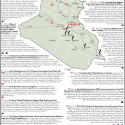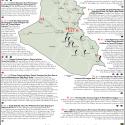Iraq Situation Report: Mach 25 - 31, 2020
Apr 3, 2020 - Katherine Lawlor, Brandon Wallace
Iran advanced multiple lines of effort in Iraq to compel the U.S. withdrawal from the country. Iran successfully organized political opposition from the most powerful Iraqi Shi’a blocs to deny parliamentary backers to Prime Minister-designate Adnan al-Zurfi. Zurfi, who enjoyed tacit U.S. and international support, is now unlikely to win a vote of confidence. The U.S. completed pre-planned consolidations from three major Iraqi bases and several smaller camps, while several European nations either completely or partially withdrew their forces from Iraq over COVID-19 concerns.










